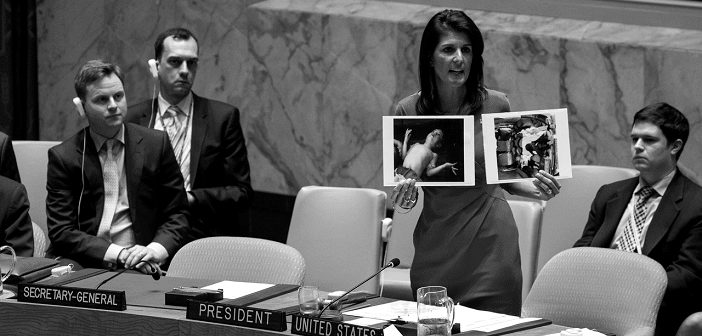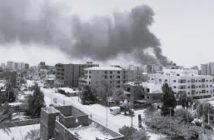For now, the triple alliance countries have raided ballistic-missiles and airstrikes against the Syrian regime led by the United States, Britain and France in response to a chemical massacre in the city of Douma, near the Syrian capital that has brought up the legalization of using military without having sufficient approval by a recognized entity into heavy debates. Mindful, the allied powers are Security Council permanent members within the international law form context, but their position from military and strategic perspective have more to do out of what can be thought a legalized operation as the international peace is at stake. U.S. ambassador to the United Nations Nikki Haley, in the days before launching the strike led by three Western states, confirmed that the US will go whether the Security Council approved or not, in her words “either way, the United States will respond”. This is not new, recalling as happened in 2003 when USA invaded Iraqi soil and toppled its regime based on a single decision taken by former President George W. Bush administration. The United Nations Charter and Security Council resolutions are rarely applicable!
In recent decades, the international institutions interpretation of applying the international law has been skeptical and inactive. In many restive points around the world where gross human incidents occurred, the UN and its apparatus always the late comer into scene. In mid 90s the ethical cleansing in former Yugoslavia where international forces were blamed for not doing enough to protect the people of Bosnia in particular during Srebrenica massacre and ongoing genocide in Darfur region of Sudan have been used widely as an example of United Nations failure. At the eve of the globalization era a new term has been coined known to be as humanitarian intervention to substitute the existing UN intervention forcibly by its blue-helmets forces. However, such mechanism is not likely to be powerfully a deter tool in the foreseeable future to prevent civilians from being repressed by their gripping regimes especially in the Middle East region where the repugnant dictatorships spread for decades if not, centuries.
World Order in policy sense is what shaped in the past world equilibrium of power and currently controls the globe by power of ascendancy and the weight of a country in arms, a race balance. But using a military force has different meanings at least both politically and strategically. Indeed using military power at the international level has been restricted lawfully as the international politicians have wished to be so. Always power should be used within a legitimized trajectory in specific scope, although every party has its own perceived understanding of coercive power applications, the debacle is that on how to measure the human concerns could have been handled.
For seven years the people of Syria have been ravaged by a brutal regime, hundreds of thousands people have been killed while others fled their homelands in a mass exodus. A human catastrophic disaster has never happened in modern world history. Instead of Assad regime being toppled by protesters and revolutionaries in pursuit of Arabs Spring upheavals, Syria has become a boiling cauldron including plethora of international forces and domestic militias depicting an image of warring mosaic—all against all. The international collision is inevitable, however the head of the regime is protected and targeted by both national and international players alike. Such situation has covered the regime with a unique umbrella and unleashed its fury so vehemently against its opponents to a degree of using prohibited chemical substances. The Balance between human and military interventions is impossible in this unique case by all measures. Firstly, international powers have their own military ground forces on the country supporting different fighting wings and other have de facto presence with remarkable military capabilities in support of the regime, namely Russian (UNSC veto right) and Iran the allies that are backing Assad regime both military and politically Russia responded to the last strike as humiliation to the Russian President personally. An interpretation that donates an implicit message to the three major countries, Russia has an international role to play as others do! Indeed today the world is not fit for a Russian empire whether in its communist or Tsarist Russia forms. That’s what Russia had inherited and stubbornly seeking such a missed role by its powerful One-man show President Vladimir Putin. The annexation of Crimea, bold intervention in Syria and the tensioned relationships with Western countries is a flagrant example.
The efforts to settle international law among nation’s disputes have been early stated in conventional international law to prevent the aggressor from being unaccountable by not applying war law to the aggressor. This is in broad sense, a theoretical manipulation could be perceived as idealistic, and inapplicable since world order is manifested and exercised by the powerful states. Therefore, the distinction between humanitarian intervention and military intervention would not be a simple mission in the Syrian crisis. The use of force can be justified as multifaceted tracks, while many argue that the international organizations i.e. the United Nations and its organs such as Security Council including their structural regulations are no longer effective for the contemporary world of political crisis.
The solution might not be in abolishing their existence, but to reform their nature and role.






3 Comments
If we respect the United Nation’s Charta every reform can be introduced, especially the democratization of the Security Council. But we have first to respect the Charta that was introduced after the experience of two world wars and the failure of the Société des Nations. Do we have to try another world war to arrive to the same conclusions ? That States and Nations are equal and then that the stronger one has no right to impose its own interpretation of the balance of power. Since the Iraqi army had no possibility (and no right) in 2003 to carry on a war to liberate political prisoners like Mumia Abu Jamal or Leonard Peltier in the USA, the US army had no right to do the same in Iraq …or now in Syria or Saudi Arabia.
Pingback: The Maghreb and Orient Courier:DEBATE / SYRIA – Does World Order Work beyond the International Law? | actualitserlande
A question that needs answering is why would any nation worth its salt see an ally and perhaps its own personnel subjected to a military attack based on a lie? Yet a lie provided by terrorist in the employ of the would be aggressor(s)? If the USA et al should ask to be allowed to fire a few missiles to save face the answer should be to tell these aggressors to go tell more lies to whoever will listen about their (fake) attack in response to a hoax false flag preceded by a big No. Russian and Syria owe the west and the USA no favors whatsoever while the west should be dropping all sanctions, especially the ones predicated on this hoax false flag. Bastardos.